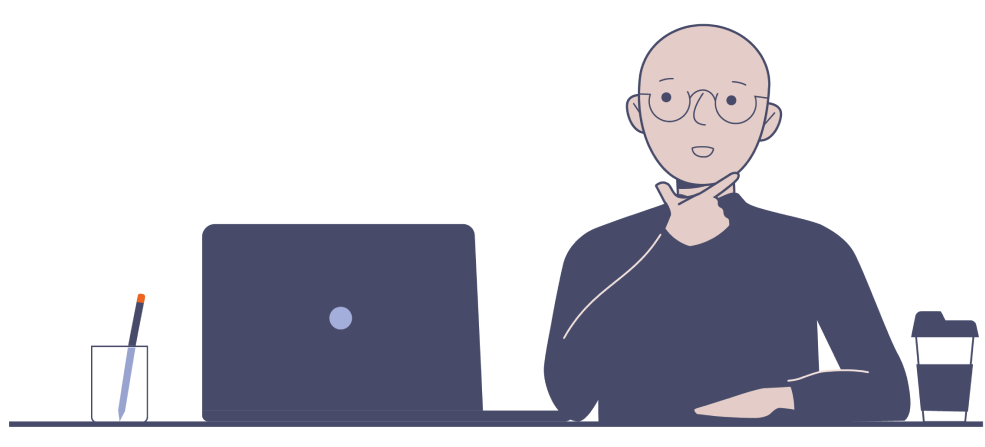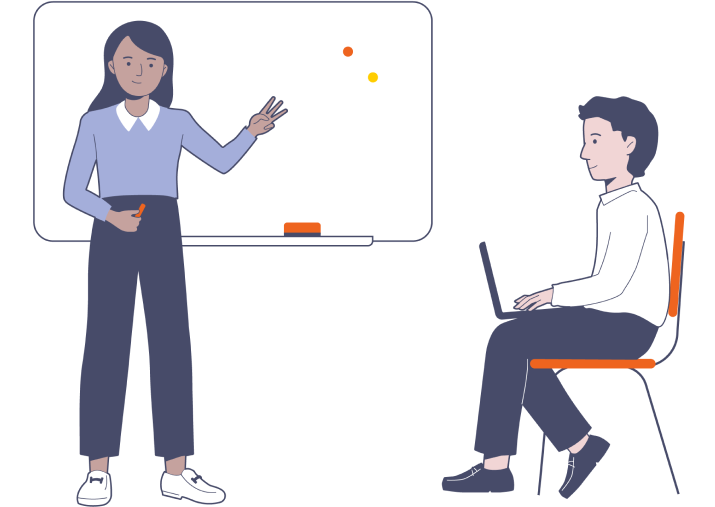
Responsive Coaching Interview with Josh Goodrich and Kat Howard Part 1
Resources|11th June 2024

PD Specialist — Steplab

Co-Founder & CEO — Steplab
What is responsive coaching and why is it so important?
Kat Howard, Executive Director of School Improvement at Windsor Academy Trust, interviewed Josh Goodrich about his recently published book Responsive Coaching to dig into the question:
What is responsive coaching and why is it so important?
Kat: Josh, can you tell us a little about your background and experience of coaching in schools?
Josh: I’ve run coaching programmes in a number of schools and also led coaching across the Oasis Trust. Every single strategy in the book and every single diagnostic question has been tested by me, but also by every single other coach at my school last year and at other schools I've worked at. All the examples and scripts in the book are derived, completely anonymously, from real coaching conversations that I’ve had and recorded.
Kat: Recently we've seen a really welcome and significant shift in terms of how we enact teacher development in schools. We seem to be moving away from PD delivered with everybody in the hall and being given the same kind of content, which is a really exciting shift for the profession. It’s also clear that coaching is a key lever for the continual improvement of teachers.
Kat: Why should the profession be thinking about responsive coaching, why does it matter?
Josh: It’s pretty clear that most of what we try to do when we do PD isn’t as effective as our teachers and students deserve it to be, especially things like away days, bringing in expensive consultants and performance management. None of this really works and therefore isn't really good enough. For lots of teachers their experience of PD is that it's ‘something to get through’, and that’s something I’ve felt too.
I wrote this book because I wanted to find a PD model which is different. PD needs to be something which teachers value. There are many studies that demonstrate the major impact of coaching as a form of PD– it has a significant impact on teachers and on pupil outcomes. In this book, I wanted to look at the confusions and misconceptions around coaching and explain what responsive coaching really is.
Kat: It’s clear that coaching is a really high-leverage approach to improving pupil outcomes and motivating teachers. But there can be some distortion of what coaching really is. Can you give us a clear definition of what we mean by coaching?
Josh: Coaching, as defined by Joyce and Showers in the 1980s, is essentially a two-person conversation; it contains cycles of observation and feedback between two people. However, what makes up the observation and feedback can vary, and not all of this is effective, so we need a deeper definition.
Kat: So what does it mean to coach effectively?
Josh: I think it means three things:
- 1.It involves the sharing and embedding of mental models and habits. Essentially, this is sharing very detailed information about effective teaching and then helping that information become part of the way the teacher operates in the classroom.
- 2.You can't do the sharing and embedding of mental models and habits without knowing what the teacher already knows about what you're trying to work on. This is the diagnosis. Therefore, it’s crucial in coaching to know what the teacher understands when you’re coaching them.
- 3.Coaching involves using effective strategies to enable teacher learning. We know more now about what makes PD have impact, for example the EEF mechanisms from the Guidance report of 2021. In our coaching we have to make sure that we're using those mechanisms.
I divided the practice section of responsive coaching into five key areas:
Kat: What are some of the common misconceptions around coaching at the moment?
Josh: The first misconception is around autonomy. The view that if you run a PD model that is solely information-sharing then you're autonomy-reducing. There's plenty of stuff that schools and school leaders can do, which reduces autonomy. For example, I was forced to change exam boards, after years of teaching English on the exam board, and all the materials were in place and we were getting great results. It didn’t work and I felt that this limited my autonomy.
We know that autonomy is good for people's work, and helps them feel happy and fulfilled. Those in favour of GROW coaching argue therefore, that the teacher must set their own goal or decide on actions to take themselves. Even in Instructional Coaching, there are some who have the view that coaches are allowed to give strategic guidance but that can only happen once the teacher has set the broader goal on their own. I have always felt that that wasn't the way that I personally learned and I found it frustrating when I was having to guess how to get better, even as a more experienced teacher. In addition, that idea isn’t really in accordance with the science of learning and what we know about how human beings learn.
Kat: Can you explain a bit more about how this model doesn’t really fit with the science of learning?
Josh: Let’s think back to those five change catalysts: awareness, insights, goal, steps, and habits to help us understand this.
For example, a teacher I’m coaching on their entry routine might be able to specify that the right thing to do when a student doesn’t enter appropriately would be to pause, let the rest of the class in, and then have a quiet conversation outside. As the coach, I might agree that that's a really good solution to that problem. If I then step in and I supply lots of additional information, I’m not helping that teacher to learn more effectively because I'm probably increasing their cognitive load; the teacher has an efficient source of information inside their head already. If teachers have a strong mental model, then when we're coaching them, we do not need to share information with them.
On the other hand, if the teacher says: ‘Well, I think I probably need to do something with them and then let the class in’ and I respond, “Cool, off you go”, they're not going to know exactly what to do. For teachers to make a successful change, they need to have a really precise idea of what to do next. In this case as the coach, I'm going to have to either ask them some further questions to help them get all the way there regarding their next steps. However, if I feel that their mental model is actually quite weak, I'm going to need to share some information with them. For example I might say: “What I think it would be good for you to work on is having a quiet word with that student, pausing the class and then letting them in.” By doing this, I am supplying information to the teacher that they need to understand to be effective in the classroom.
To summarise: this is the shape of the diagnostic process, which is illustrated in the diagram below. I first ask a diagnostic question. If I find that the teacher's mental model is weak, then I'm going to do some coaching that TELLS, e.g. I might suggest a good next step for you would be X.
If the teacher’s mental model is partial or approaching where it needs to be, I'm going to do some ASKING as a coach.
If the teacher’s mental model is super strong, I’m not going to interfere, I'm going to MOVE on.

That approach accords with lots of very well-evidenced findings about the science of learning such as cognitive load theory. If someone does not have the information they need, then the discovery-learning approach is just a wildly inefficient way of helping them to learn. Why would we get teachers to guess how to improve if they do not know? That's not the way we do things in any other sector, and we certainly don't do it with our students. But if people do know, then the expertise-reversal effect suggests that we should rely on the information they have at that point – a discovery or problem-based learning approach becomes more effective. In summary, we should rely on the teacher’s knowledge. That key insight is how the whole responsive coaching approach works.
Kat: What you’ve just captured there is that important balance between what we know about how we learn and the responsive aspect of people leading their own development. I think that's why responsive coaching plays a critical role in the teacher development space.
Josh: Ultimately, according to the research on self determination through autonomy, sharing information when people need it to change is absolutely not de-autonomising. If you share information with someone and they're able to run it through their own reasoning processes and agree that it would be effective for them in their classroom then that goal you're sharing with them becomes their goal. It’s never a coach telling a teacher to do something which they don’t agree to and being told to do it anyway. But, if we have a teacher who's struggling to improve even though they want to, who doesn't know how to improve their lessons, that person is not autonomous.
We also know that success breeds motivation and not necessarily the other way round. So if we're creating those conditions for success for teachers it’s development where they can feel good about what they're doing because they feel successful. We all know how horrible it feels when you walk away from a lesson that you know hasn’t gone well and you don't know what to do about it next. Having a relationship with a coach where you have someone who can help you to achieve a goal together and support you in being successful is going to make you more motivated and happy about your job.
Key Takeaways:
- 1.Coaching involves the sharing and embedding of mental models, diagnosis and the use of effective strategies to enable teacher learning.
- 2.There are 5 catalysts for teacher change: Strengthen awareness, Gain insights, Set goals, Establish steps, Build habits.
- 3.Responsive coaching involves asking questions to find out what a teacher’s mental models are.
To speak to one of our team about how responsive coaching can supercharge your school or trust, get in touch to book a Steplab demo. To find out more about Responsive Coaching, order your copy of Steplab founder & CEO Josh's book Responsive Coaching.
Happy coaching!


